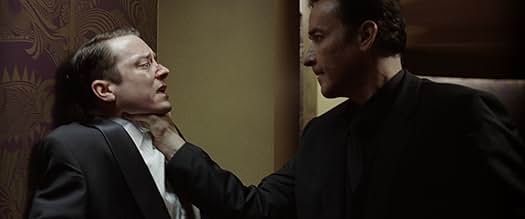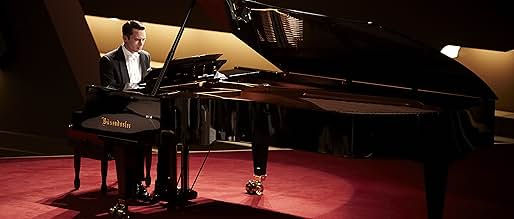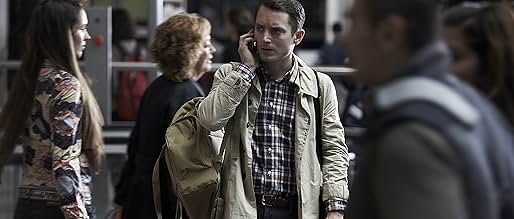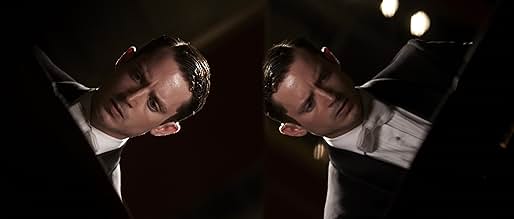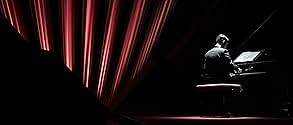IMDb-BEWERTUNG
5,9/10
20.178
IHRE BEWERTUNG
Füge eine Handlung in deiner Sprache hinzuA pianist with stage fright endures a performance under the eyes of a mysterious sniper, who will shoot and kill him if a wrong note is played.A pianist with stage fright endures a performance under the eyes of a mysterious sniper, who will shoot and kill him if a wrong note is played.A pianist with stage fright endures a performance under the eyes of a mysterious sniper, who will shoot and kill him if a wrong note is played.
- Auszeichnungen
- 5 Gewinne & 12 Nominierungen insgesamt
Beth Rollan
- Emma's Publicist
- (as a different name)
Richard Newby
- Executive
- (as Richard A. Newby)
Eric Goode
- Tom's Chauffeur
- (as Eric L. Goode)
Empfohlene Bewertungen
When pitched the idea might have seemed novel if hardly riveting, (a concert pianist about to perform finds a note on his sheet music telling him that if he plays a wrong note he and/or his wife will be killed), but this thriller, penned by current Hot Young Thing Damien Chazelle and directed by Eugenio Mira, is surprisingly suspenseful. Indeed this is the kind of conceit that Hitchcock might have toyed with, (something similar was seen some years back when Colin Farrell found himself trapped in a phone-box with a sniper's rifle trained on him). Of course, that movie, "Phone Booth" had the streets of the city to play with; the problem facing Mira is how to keep us glued to a limited set, (in this case a concert hall), and a fixed time span, not to mention 'inflicting', on perhaps a less than enthusiastic audience, a lot of semi-classical music. That he, and lead actor Elijah Woods, as well as the off-screen voice of potential killer John Cusack, pull it off is a credit to them all. Also, for something so seemingly insular, Mira makes excellent use of the widescreen. Perhaps more destined for cult status than mass consumption but certainly worth seeing.
The plot in a sentence: a piano player has to play an 'impossible' piece perfectly or a bunch of people are gonna get whacked.
Now put that in your pocket and forget about it. I'm serious; if I hear one more person whining about the silly plot, I'm going to strangle someone with a low A string.
To make a point, let me throw a different plot-in-a-sentence at you: two strangers agree that they'll each commit murder for the other guy. I'm sure the silly-o-meter is lighting up, but cinephiles will recognize that plot from the classic Hitchcock masterpiece "Strangers on a Train". Hitchcock himself joked how insignificant a plot can be, introducing the concept "mcguffin", something that doesn't necessarily exist but is the motivation behind all the characters' actions. Like a box that everyone's killing each other over.
Why am I harping on Hitchcock? Because "Grand Piano" is perhaps the most loving tribute to Hitchcock that I've seen in my life. This means it's a throwback to the days when thrillers didn't need 29 plot twists, 54 explosions and 3.75 sex scenes to keep audiences awake. The audience's enjoyment came via the filmmaker's technique at telling a story. If you've ever been at a campfire when your spooky uncle Greg tells the story of "the claw" for the millionth time, to the delight of everyone present, you know what I mean.
So now let's talk about the storytelling presentation. I'm trying hard not to slip into film dweeb mode, because the technical points of this film are so stunning I could ramble for hours. Camera shots are carefully planned and orchestrated without distracting edits, meaning the camera often follows the action for several minutes before jumping to another angle. This is reminiscent of the famous Orson Welles "Touch of Evil" opening where the camera runs for nearly 4 minutes through city streets and dialogue closeups before a cut. Or how about Hitchcock's own "Rope", a 2 hour suspense thriller with only 10 camera cuts. Here in "Grand Piano" such scenes are prevalent, and the best one has to be the "Wayne" scene which follows the character Wayne frantically running through the theater for help while the action on the stage remains in the background. No cuts. If you're wondering how the eff they managed to do that, check out the movie.
Another piece of technical WOWery which you might not consider at first is that actor Elijah Wood is really playing the piano. In real life Elijah is a casual pianist who had to take a 3 week crash course in how to play the parts in his scenes, which often involve dialogue and physical action while staying right in time with the music he's playing with his hands. If you're one of those people who hates it when actors can't fake their instruments, rest assured this is very convincing. The director himself is a musician so you can bet he insisted on getting things right.
Which leads me to my overall feeling about this film. It is extremely precise. Not a scene is wasted, and every element is carefully orchestrated like, well, like an orchestra. Basically the entire film unfolds in real time, as Elijah ("Tom") tries to make it through 3 movements of a classical performance without too many bodies piling up. The movie's "soundtrack" is actually the music that's being played by the orchestra as the story unfolds. That itself is an original and very impressive feat, if you consider every scene has to be synchronized with the mood of the performance piece.
What makes "Grand Piano" extra fun is that the movie is not afraid to make fun of itself a bit. There's some nice humor and a sort of lighthearted cheekiness to it, even though there might be a few brutal killings going on. You could almost call this a "dark comedy" except that all the classic thrillers were dark comedies, so such a label would be redundant. It should be noted that Hitchcock himself had a wonderfully morbid sense of humor, and here the director upholds that spirit as well as the classic storytelling style. Anyone taking this plot too seriously should be hung from the rafters with rusty bolts and dangled over an orchestra pit playing fortissimo. Oh wait, that might've happened in the movie.
The acting. I won't dwell on Elijah Wood's amazing performance except to note that prior to this film I hadn't seen much of his work, and this movie made me an instant fan. John Cusack is... well, John Cusack. He's one of those actors like Christopher Walken who can sneeze and make it an Oscar winning performance. Although he doesn't get a ton of screen time here, his scenes were gripping. Another actor who deserves major kudos for bringing to life the terrifying/hilarious/lovable henchman character is Alex Winter (wait for it... wait for it... BILL from "Bill & Ted's Excellent Adventure"!) Omg he gets my vote for best bad guy sidekick since Jaws in James Bond Moonraker. And finally I have to tip my hat to "Wayne" (Allen Leech) and his barbie-doll manipulative girlfriend "Ashley" (Tamsin Egerton) who are a real treat to watch.
This movie has so many fun things going on, you forget how technically masterful it is. Like the old thrillers of the 40s & 50s, that's the way it's supposed to be. It's a funny irony that a Spanish production does the best justice to the golden age of Hollywood.
Now put that in your pocket and forget about it. I'm serious; if I hear one more person whining about the silly plot, I'm going to strangle someone with a low A string.
To make a point, let me throw a different plot-in-a-sentence at you: two strangers agree that they'll each commit murder for the other guy. I'm sure the silly-o-meter is lighting up, but cinephiles will recognize that plot from the classic Hitchcock masterpiece "Strangers on a Train". Hitchcock himself joked how insignificant a plot can be, introducing the concept "mcguffin", something that doesn't necessarily exist but is the motivation behind all the characters' actions. Like a box that everyone's killing each other over.
Why am I harping on Hitchcock? Because "Grand Piano" is perhaps the most loving tribute to Hitchcock that I've seen in my life. This means it's a throwback to the days when thrillers didn't need 29 plot twists, 54 explosions and 3.75 sex scenes to keep audiences awake. The audience's enjoyment came via the filmmaker's technique at telling a story. If you've ever been at a campfire when your spooky uncle Greg tells the story of "the claw" for the millionth time, to the delight of everyone present, you know what I mean.
So now let's talk about the storytelling presentation. I'm trying hard not to slip into film dweeb mode, because the technical points of this film are so stunning I could ramble for hours. Camera shots are carefully planned and orchestrated without distracting edits, meaning the camera often follows the action for several minutes before jumping to another angle. This is reminiscent of the famous Orson Welles "Touch of Evil" opening where the camera runs for nearly 4 minutes through city streets and dialogue closeups before a cut. Or how about Hitchcock's own "Rope", a 2 hour suspense thriller with only 10 camera cuts. Here in "Grand Piano" such scenes are prevalent, and the best one has to be the "Wayne" scene which follows the character Wayne frantically running through the theater for help while the action on the stage remains in the background. No cuts. If you're wondering how the eff they managed to do that, check out the movie.
Another piece of technical WOWery which you might not consider at first is that actor Elijah Wood is really playing the piano. In real life Elijah is a casual pianist who had to take a 3 week crash course in how to play the parts in his scenes, which often involve dialogue and physical action while staying right in time with the music he's playing with his hands. If you're one of those people who hates it when actors can't fake their instruments, rest assured this is very convincing. The director himself is a musician so you can bet he insisted on getting things right.
Which leads me to my overall feeling about this film. It is extremely precise. Not a scene is wasted, and every element is carefully orchestrated like, well, like an orchestra. Basically the entire film unfolds in real time, as Elijah ("Tom") tries to make it through 3 movements of a classical performance without too many bodies piling up. The movie's "soundtrack" is actually the music that's being played by the orchestra as the story unfolds. That itself is an original and very impressive feat, if you consider every scene has to be synchronized with the mood of the performance piece.
What makes "Grand Piano" extra fun is that the movie is not afraid to make fun of itself a bit. There's some nice humor and a sort of lighthearted cheekiness to it, even though there might be a few brutal killings going on. You could almost call this a "dark comedy" except that all the classic thrillers were dark comedies, so such a label would be redundant. It should be noted that Hitchcock himself had a wonderfully morbid sense of humor, and here the director upholds that spirit as well as the classic storytelling style. Anyone taking this plot too seriously should be hung from the rafters with rusty bolts and dangled over an orchestra pit playing fortissimo. Oh wait, that might've happened in the movie.
The acting. I won't dwell on Elijah Wood's amazing performance except to note that prior to this film I hadn't seen much of his work, and this movie made me an instant fan. John Cusack is... well, John Cusack. He's one of those actors like Christopher Walken who can sneeze and make it an Oscar winning performance. Although he doesn't get a ton of screen time here, his scenes were gripping. Another actor who deserves major kudos for bringing to life the terrifying/hilarious/lovable henchman character is Alex Winter (wait for it... wait for it... BILL from "Bill & Ted's Excellent Adventure"!) Omg he gets my vote for best bad guy sidekick since Jaws in James Bond Moonraker. And finally I have to tip my hat to "Wayne" (Allen Leech) and his barbie-doll manipulative girlfriend "Ashley" (Tamsin Egerton) who are a real treat to watch.
This movie has so many fun things going on, you forget how technically masterful it is. Like the old thrillers of the 40s & 50s, that's the way it's supposed to be. It's a funny irony that a Spanish production does the best justice to the golden age of Hollywood.
Suspenseful? -- not so much. But you will want to watch to the end because there is just enough happening to keep your attention.
This is an odd little movie with Wood playing a rather nervous pianist about to perform one of the most complex and challenging music compositions ever written. Then he discovers his life is on the line.
My problem was the constant running off and on stage during the performance because he appears to suffer more from a bowel or bladder issue. He is constantly up and down and running around throughout the concert but always back --- just in time for his piano playing! It got funny after awhile.
The set is pleasing and there aren't many surprises in the plot ... but watch to the very end because something happens!
This is an odd little movie with Wood playing a rather nervous pianist about to perform one of the most complex and challenging music compositions ever written. Then he discovers his life is on the line.
My problem was the constant running off and on stage during the performance because he appears to suffer more from a bowel or bladder issue. He is constantly up and down and running around throughout the concert but always back --- just in time for his piano playing! It got funny after awhile.
The set is pleasing and there aren't many surprises in the plot ... but watch to the very end because something happens!
The amount of inconsistencies and wildly implausible things in this film, not even related to the story but related to the art of piano playing, really shouldn't be addressed. The film doesn't take itself seriously and clearly seems to know how preposterous it is, and it doesn't care. It has a hell of a lot of fun in what its doing, and by that I mean I did. There's a vibrant energy to this that really makes it pop and work like music in the best scenes, those scenes involving the tense plot work along with the concertos being played. It's really interesting and doesn't feel half-baked like so many thrillers do. Very fun film, definitely recommended.
Entertaining suspense movie packs intrigue and ordinary touches in Hitchcock style . Top-notch thriller embroils a famous pianist in killing and twisted intrigue . Having messed up at playing an extremely difficult piano piece a few years before, talented pianist Tom Selznick (Elijah Wood) lives with an extreme case of stage fright . Taking a step in the right direction and talked into it by his up and coming actress wife (Kerry Bishé) , Tom decides to give performing live another try . Already a mess, the situation is made much worse, when in the middle of playing a much easier musical number, Tom discovers a strange note written on his music sheet , the premise is the following : Play or Die .
Ultra-tense Spanish thriller starring Elijah Wood as a concert pianist who moments before his comeback performance suffers from stage fright and to discover that if he fails to play the music precisely as it was written , a nearly impossible feat in this case , then a sniper hidden in the theater will open fire. The picture is realized in Hitch wake , as it has a great number of elements and his own iconography : vertiginous height , innocent man wrongfully chased , blonde bombshells , voyeurism, long non-dialogue sequences , a matter of mistaken identity , MacGuffin ,etc. Do you know what a MacGuffin is, Maestro? It's a person or thing around which the entire film revolves and yet turns out to have little importance to the story . It's a magnificent device whereby a good plot can be given a driving force without the indecency of explanation . Grand Piano (2013), from director Eugenio Mira is an exciting film displaying suspense , intrigue , tension , and interesting drama well written by Damien Chazelle . Packs an ordinary theme of the suspense magician : innocent people become caught up in a cobweb intrigue and uncanny , intelligent villains . From the thrilling story and screenplay including literately and thoughtful dialog , the picture gets unlimited suspense in crescendo , tense , full of lingering frames and with the typical touches Hitchcock . And plenty of MacGuffins , as this picture is heavy with devices . A hidden threat, a hostage, an assistant, an unplayable piece of music, a stage, a key, and the unknown fortune of a deceased mentor .
Enjoyable mystery movie involves a bewildered pianist who hold numerous tricks in order to escape from a cruel killer and being chased cross hall concert and backstage . This agreeable picture by Eugenio Mira has a memorable scene after another and following the steps from master of suspense . This film has these particularities ; furthermore contains a fun intrigue , amusing situations and keeps the action at feverish pitch . Grand Piano is Hitchockian in the truer sense : It's a meticulously crafted piece of filmmaking that's wholly committed to a highly specific , somewhat outlandish premise . In addition , a colorful as well as evocative cinematography by Unax Mendia . Special mention to impressive and rousing musical score by Victor Reyes . The motion picture was well directed by Eugenio Mira (Agnosia , Birthday) and perfectly produced by Rodrigo Cortes (Buried , Red lights) . Mira played these elements like a concert pianist, perfectly timed with a soaring melody. Rating : Above average , well worth watching .
Ultra-tense Spanish thriller starring Elijah Wood as a concert pianist who moments before his comeback performance suffers from stage fright and to discover that if he fails to play the music precisely as it was written , a nearly impossible feat in this case , then a sniper hidden in the theater will open fire. The picture is realized in Hitch wake , as it has a great number of elements and his own iconography : vertiginous height , innocent man wrongfully chased , blonde bombshells , voyeurism, long non-dialogue sequences , a matter of mistaken identity , MacGuffin ,etc. Do you know what a MacGuffin is, Maestro? It's a person or thing around which the entire film revolves and yet turns out to have little importance to the story . It's a magnificent device whereby a good plot can be given a driving force without the indecency of explanation . Grand Piano (2013), from director Eugenio Mira is an exciting film displaying suspense , intrigue , tension , and interesting drama well written by Damien Chazelle . Packs an ordinary theme of the suspense magician : innocent people become caught up in a cobweb intrigue and uncanny , intelligent villains . From the thrilling story and screenplay including literately and thoughtful dialog , the picture gets unlimited suspense in crescendo , tense , full of lingering frames and with the typical touches Hitchcock . And plenty of MacGuffins , as this picture is heavy with devices . A hidden threat, a hostage, an assistant, an unplayable piece of music, a stage, a key, and the unknown fortune of a deceased mentor .
Enjoyable mystery movie involves a bewildered pianist who hold numerous tricks in order to escape from a cruel killer and being chased cross hall concert and backstage . This agreeable picture by Eugenio Mira has a memorable scene after another and following the steps from master of suspense . This film has these particularities ; furthermore contains a fun intrigue , amusing situations and keeps the action at feverish pitch . Grand Piano is Hitchockian in the truer sense : It's a meticulously crafted piece of filmmaking that's wholly committed to a highly specific , somewhat outlandish premise . In addition , a colorful as well as evocative cinematography by Unax Mendia . Special mention to impressive and rousing musical score by Victor Reyes . The motion picture was well directed by Eugenio Mira (Agnosia , Birthday) and perfectly produced by Rodrigo Cortes (Buried , Red lights) . Mira played these elements like a concert pianist, perfectly timed with a soaring melody. Rating : Above average , well worth watching .
Wusstest du schon
- WissenswertesWood had worked with a teacher three weeks prior to going to Barcelona and found it stressful having to play the piano and speak at the same time saying, "It was incredibly technical [...] lots of moments where it was jumping from where I'd play, listen to a click, listen to music, have to be in the right place and the right time and hear dialogue and repeat dialogue".
- PatzerThe opening drive into Chicago begins southbound on Lake Shore Drive, then northbound on LaSalle (recognizable from the Batman films), then south on Wabash, then suddenly across the river, coming east on Washington, where the car finally stops at the Lyric Opera building. The interiors were shot elsewhere, so nothing looks like the actual hall.
- Crazy Credits"The Impossible Piece" plays as the end credits roll.
- VerbindungenFeatured in Dont' Miss a Note: The Making of Grand Piano (2014)
- SoundtracksTen Happy Fingers
Written by Dr. Seuss (as Theodore Geisel) and Friedrich Hollaender (as Frederick Hollander)
from Die 5000 Finger des Dr. T (1953) (uncredited)
Used by permission of Shapiro Bernstein Spain Mood Music Division
Courtesy of Columbia Pictures Industries,Inc.
Under license from Sony Pictures Music group
Top-Auswahl
Melde dich zum Bewerten an und greife auf die Watchlist für personalisierte Empfehlungen zu.
Details
- Erscheinungsdatum
- Herkunftsländer
- Offizielle Standorte
- Sprache
- Auch bekannt als
- Grand Piano
- Drehorte
- Produktionsfirmen
- Weitere beteiligte Unternehmen bei IMDbPro anzeigen
Box Office
- Bruttoertrag in den USA und Kanada
- 22.555 $
- Eröffnungswochenende in den USA und in Kanada
- 2.964 $
- 9. März 2014
- Weltweiter Bruttoertrag
- 1.618.085 $
- Laufzeit
- 1 Std. 30 Min.(90 min)
- Farbe
- Sound-Mix
- Seitenverhältnis
- 2.35 : 1
Zu dieser Seite beitragen
Bearbeitung vorschlagen oder fehlenden Inhalt hinzufügen




